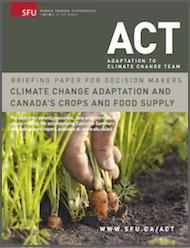Climate Change Adaptation and Canada’s Crops and Food Supply: Briefing Paper for Decision Makers


Introduction
Over the past several decades, Canadian agriculture has demonstrated a remarkable capacity to improve productivity under wide ranging and seasonally fluctuating growing conditions as well as to recover from extreme events such as floods and droughts. This capacity has been supported through relatively high public sector investments (in some cases supported by the private sector) in supply chain innovation, infrastructure and extension services and insurance and disaster relief. It has also been aided by a long period of relative climate stability. Recently, however, the level of this public sector support has been reduced at the very time that it should be strengthened.
Climate change now presents an unprecedented challenge to this adaptive capacity. The frequency and magnitudeof extreme climate events will increasingly lie outside the range of natural variability that has been the norm, a situationknown as “non-stationarity.” Floods of a magnitude that we once expected to occur once in a hundred years will occurfar more frequently, while long, hot, dry summers will become the norm; some regions in Canada are already experiencingmajor droughts and floods in the same year. Warmer temperatures will also facilitate the spread of new pests.
The resulting impacts will be increasingly complex, affecting not only food production, but also the entire foodsupply chain from field to table.
This briefing outlines the current and anticipated impacts of projected climate changes of climate change on Canadianagriculture and food security; the inter-relationship between food, water, energy and biodiversity; and proposals foradaptation measures that can capitalize on opportunities and reduce or avoid the impacts of a changing climate.
Climate Change and Canadian Food Production – Short and Long term impacts
Food production and security is not only critical to human health, it is also a significant economic driver essential to the well-being of communities and regions across Canada. With export sales of $40.3 billion, Canada is the world’s sixth largest exporter of agriculture and agri-food products. Primary agriculture alone accounts for some $22.2 billion dollars (or 1.7%) of Canada’s gross domestic product.
In 2011 primary agriculture and food, beverage and tobacco processing directly employ more than 571,800 people(or 3.3% of the employed labour force). Moreover, the wider “food sector” (including sub-sectors such as food andbeverage processing, food service, and food retail and wholesale), in which primary agriculture plays an important role,has been linked to as many as 1 in 8 jobs in Canada.
The changing climate in Canada will have two key impacts on food production:
- Regional shifts in temperature and precipitation, which will result in long term changes to productivity andlocation of food production.
- Increased variability and extremes in floods, droughts, pest outbreaks and fires with short-term impacts onproduction.
- In 2001-2002, droughts in the Prairie Provinces caused $3.6 billion in lost production and resulted in over40,000 people being out of work.
- In 2011, floods in Manitoba’s Red River Basin caused $936 million in direct damages. Subsequent First Nationlawsuits total an additional $1.15 billion.
- In 2010/11, extreme precipitation during harvest of vegetables in the Fraser Valley, British Columbia resultedin $6.3 million in losses.
- In 2012, drought and high temperatures in the American mid-west reduced corn and maize crop production,spiking food costs worldwide and sending some UK pig farmers out of business due to the price of feed. Recentspring rains have relieved the drought in some parts but it still rated exceptional in the High Plains.
- In late 2012, concerns were raised about post-drought water levels making the Mississippi River impassible forbarges north of St Louis, which could lead to $7 billion in lost trade and higher food prices resulting from increasedrail transportation costs. The US Army Corps of Engineers was tasked with using explosives to deepenthe riverbed.
- BC imports more than half of its food, including most of its salad vegetables from California. The availabilityof these foods will be affected by climate changes in those production areas.
See other briefing papers from the Adaptation to Climate Change Team
(0) Comments
There is no content